From eatthis.com
Find out if any of part of your diet is causing you to toss and turn when it's time to sleep
You're lying there, staring at the clock, waiting for sleep to set in, but for some reason, you just can't seem to wind down. Was it something you ate? Possibly. There's definitely a connection between your diet and your night-time rest. A variety of eating habits can trigger an episode of insomnia—or even create chronic sleep problems.
If you're wondering whether the contents of your dinner are causing you to toss and turn at bedtime, read on to learn more about six common eating and drinking habits that can affect sleep. And for more, don't miss the 40 Best & Worst Foods to Eat Before Sleep. (After all, you're awake anyway!)
Overdoing it on caffeine
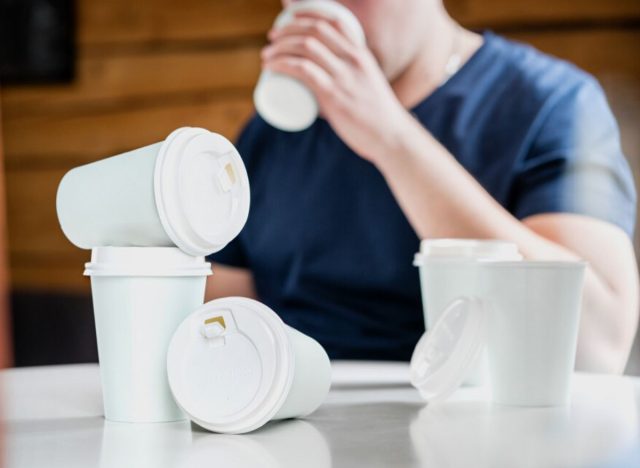
No surprise here! Caffeine is notorious for its stimulant effects. This natural substance—found in coffee, tea, soda, chocolate, certain supplements, and various other products—blocks the brain's receptors for adenosine, a chemical that promotes sleep. Overconsuming caffeine throughout the day (or eating and drinking caffeine-containing foods and drinks too close to bedtime) is a recipe for night-time wakefulness.
Caffeine's effects tend to peak about 30-60 minutes after consumption, but it may take some mindful attention to determine your own tolerance. Some people are so caffeine-sensitive that even their morning cup could disrupt their sleep. With trial and error, you should be able to identify your personal coffee cut-off hour.
Indulging in energy drinks
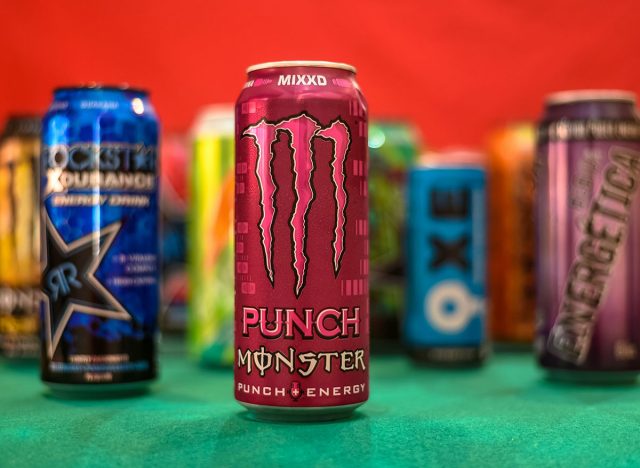
Not all pick-me-up drinks are caffeinated. Some, like certain herbal energy drinks, contain other substances designed to perk you up. While this can be a boon during the afternoon slump, it's not such a great idea as bedtime nears, as (like caffeine) they can keep you bright-eyed and bushy-tailed when you'd really rather sleep.
If you favour drinks with stimulant ingredients like ginseng, Rhodiola rosea, and maca root, be sure to imbibe early in the day to avoid disrupted sleep. (And find out the surprising effects of giving up energy drinks.)
Eating spicy foods before bed
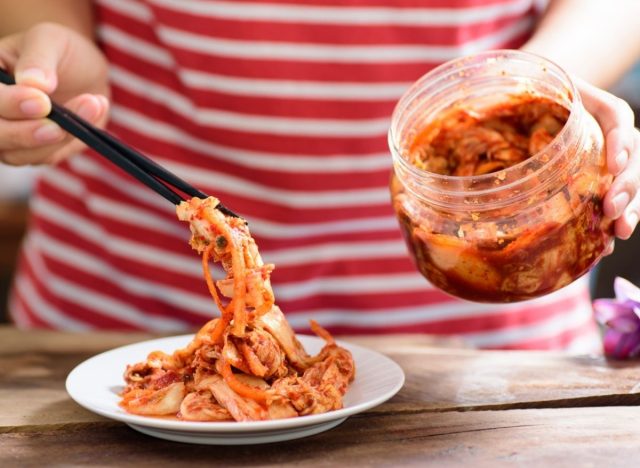
There's nothing wrong with the occasional midnight snack. But, for better rest, just don't make it a taco or a curry. Eating spicy foods can cause heartburn at any time, but especially when you lie down. Without gravity to keep stomach acid in place, it travels more easily up the oesophagus, leading to pain, sour belches, and indigestion of GERD (gastroesophageal reflux disease). Research shows that people with GERD are more likely to report sleep problems than the general population.
Of course, that doesn't mean foods with a kick are off the menu entirely! Try opting for spicy items at lunchtime and stick to milder foods for your evening meal.
Eating too much saturated fat
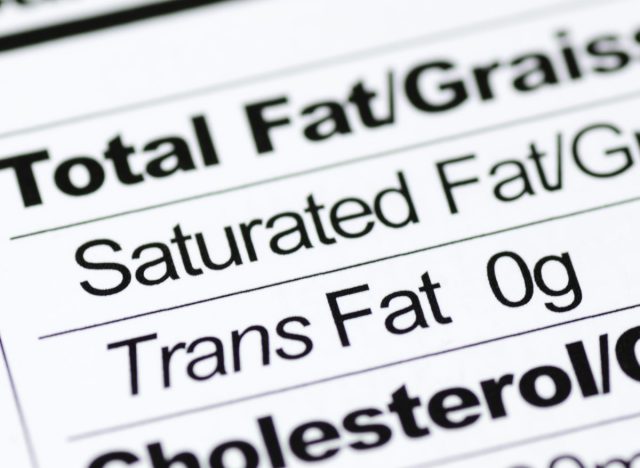
Some studies have raised the question of how saturated fat impacts sleep—and the results aren't good. According to 2020 research that reviewed multiple such studies, high saturated fat consumption during the day caused sleep quality to deteriorate at night. One study in the review found that people with a higher saturated fat diet were more likely to have frequent night-time wakings and less restorative sleep overall.
Fortunately, not all fat will mess with your rest. Omega-3 fatty acids have a track record of actually promoting sleep! DHA and EPA-rich oils have been shown to increase sleep efficiency and reduce the time it takes to fall asleep. To get more of these beneficial oils, reach for flax seeds, walnuts, and fatty fish like tuna and salmon.
Need a sleep-inducing bedtime snack to choose from instead? Check out the #1 best food to eat for better sleep.
Eating too many refined carbs
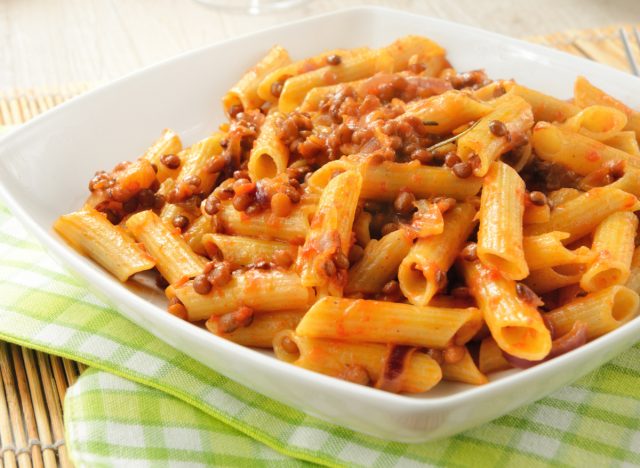
A diet high in refined carbs can increase the risk of weight gain, heart disease, and diabetes. You can add one more downside to the list: insomnia.
According to a large 2019 study, older women who consumed the highest amounts of refined carbohydrates (think: white bread, pastries, and pasta) were more likely to have difficulty getting a good night's rest. They were also more likely to develop new insomnia at a three-year follow-up.
The likely explanation for the connection between refined carbs and poor sleep: these types of carbohydrates rapidly spike blood sugar. High blood sugar has consistently been linked with sleep disruptions like sleep apnoea and general insomnia.
Not getting enough of certain nutrients
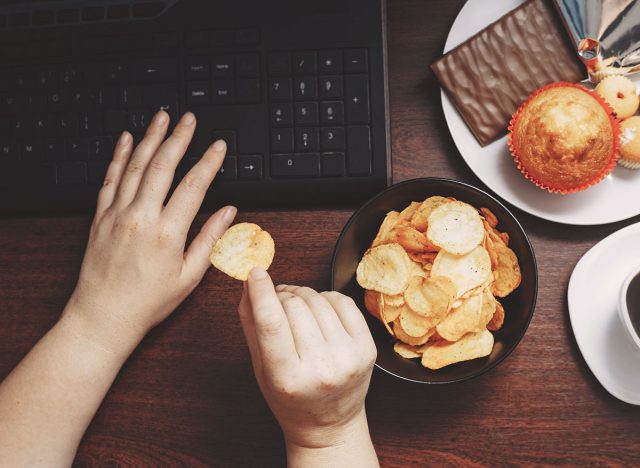
The best sleeping pill just might be a multivitamin. There's a fascinating interplay between healthy sleep and the micronutrients in food. You may have heard magnesium recommended for shut-eye, but it's not the only option in your micronutrient arsenal. Research from 2019 found that people with short sleep duration had a lower-than-usual intake of various vitamins and minerals, including calcium, vitamin D, vitamin K, and (yes) magnesium. Similarly, a 2016 study associated sleep deprivation with low levels of iron, zinc, and magnesium.
The best way to ensure you're meeting your daily target of vitamins and minerals is to eat a healthy, varied diet—but talk to your doctor if you feel you could use some extra nutritional oomph from a supplement.
No comments:
Post a Comment